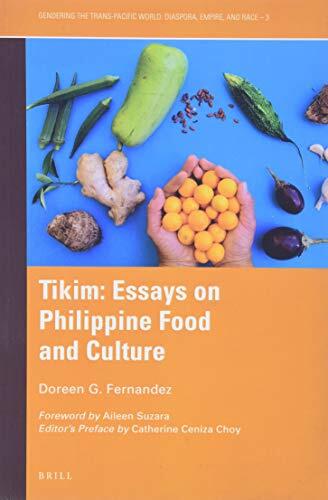
Tikim: Essays on Philippine Food and Culture
No ratings yet
Children’s
History
Cookbooks
Format
Paperback
Pages
236
Language
Dutch, Flemish
Published
Jan 1, 2021
Publisher
BRILL
ISBN-10
900445375X
ISBN-13
9789004453753
Description
Exploring the rich tapestry of Philippine food and culture, this collection of essays delves into the intricate relationships between culinary practices and cultural identity. Doreen G. Fernandez presents a thought-provoking examination of how food serves as a medium for understanding the broader social and historical narratives of the Philippines. Each essay invites the reader to consider the ways in which food transcends mere sustenance, becoming a vital part of cultural expression and community bonding.
The insights drawn from various facets of Filipino cuisine reveal the complexities of gender roles, traditions, and the impact of globalization on local practices. Fernandez emphasizes the significant role that women play in maintaining culinary heritage, often acting as the gatekeepers of recipes and cultural traditions passed down through generations. This exploration illustrates how food not only nourishes the body but also sustains the spirit of a culture in flux.
Through personal anecdotes, historical context, and critical analysis, the essays weave together the threads of history, identity, and food politics, thereby shedding light on the broader implications of culinary practices in a rapidly changing world. The narratives encourage a deeper appreciation for the art of cooking and the significance it holds within Filipino communities.
Ultimately, these reflections on food invite readers to ponder the cultural meanings embedded in every meal, urging them to consider their own relationship with cuisine as a dynamic part of their identity. The work serves as a compelling reminder of how food can serve as both a source of comfort and a lens through which to view the complexities of culture and identity in the modern world.
The insights drawn from various facets of Filipino cuisine reveal the complexities of gender roles, traditions, and the impact of globalization on local practices. Fernandez emphasizes the significant role that women play in maintaining culinary heritage, often acting as the gatekeepers of recipes and cultural traditions passed down through generations. This exploration illustrates how food not only nourishes the body but also sustains the spirit of a culture in flux.
Through personal anecdotes, historical context, and critical analysis, the essays weave together the threads of history, identity, and food politics, thereby shedding light on the broader implications of culinary practices in a rapidly changing world. The narratives encourage a deeper appreciation for the art of cooking and the significance it holds within Filipino communities.
Ultimately, these reflections on food invite readers to ponder the cultural meanings embedded in every meal, urging them to consider their own relationship with cuisine as a dynamic part of their identity. The work serves as a compelling reminder of how food can serve as both a source of comfort and a lens through which to view the complexities of culture and identity in the modern world.
Reviews
Reading Log
No reading logs found
Start tracking your reading progress to see logs here
Add Your First Reading LogNotes
Transaction Log
No transaction logs found
Start tracking your book transactions to see logs here
Add Your First Transaction Log